Section 3: LITHUANIA TODAY
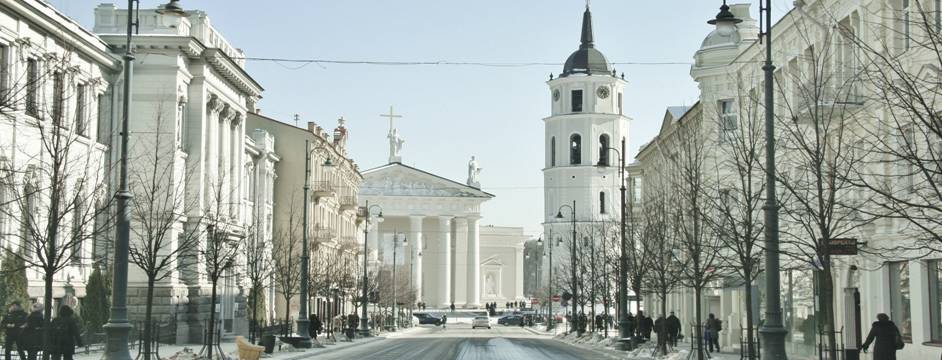

THE VOICE OF INTERNATIONAL LITHUANIA
|
VilNews has its own Google archive! Type a word in the above search box to find any article.
You can also follow us on Facebook. We have two different pages. Click to open and join.
|
Sun, 22nd May, 2011 - (3) Comment
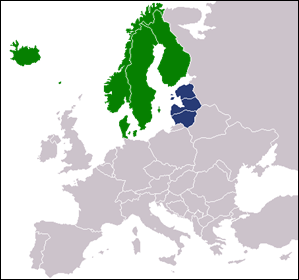
New collaboration constellations are forming in our today’s Europe. The potential new alliance between France, Germany, Poland and Russia is an example of that.
This new approach, between countries that previously were relatively far apart, as well as the so-called G-8 and G-20 alliances between the world’s richest countries are examples of how we seem to be moving into a new World Order. Also in good old Europe we are now beginning to develop entirely new constellations.
Typical of such constellations is that the largest and richest countries take initiatives to secure their own positions and welfare, while smaller countries often have to put up with playing second fiddle.
What the three Baltic States now face is that being members of the EU is not enough. The economic crisis, and partly also questions on defence and security, have led to new forms of cooperation, as the aforementioned , and our small nations far north in Europe are not invited to become active participants.
It is therefore my opinion that a tight collaboration with the other Nordic countries is the way to go. Together we are large and powerful enough to be heard, and our common identity and cultural background is a good basis for cooperation.
Tue, 3rd May, 2011 - (0) Comment
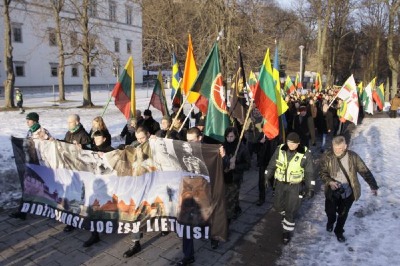
Neo-Nazis marching in Vilnius during
Lithuania’s Independence Day, 11 March 2011.
Photo: http://holocaustinthebaltics.com
Intolerance, racism, anti-Semitism, xenophobia and homophobia. These are words and terms we unfortunately have heard and seen far too often in Lithuanian media in recent years.
This country that for hundreds of years was a thriving cradle for co-existence between people from many nations, cultures and religions. Or, as the British historian Norman Davies puts it: “Lithuania was a haven of tolerance”. Davies was not the only one who took notice of this. Erasmus of Rotterdam (1466 – 1536) is quoted as stating; “I congratulate this nation [Lithuania] which now, in sciences, jurisprudence, morals, and religion, and in all that separates us from barbarism, is so flourishing that it can rival the first and most glorious of nations.”
But no longer so. Today’s Lithuania faces several forms and manifestations of intolerance. According to B.O. Dittrich (2007), Lithuania is the most homophobic of all the EU countries. In 2000 a survey conducted by European Value Study Group showed that the level of xenophobia in Lithuania is one of the highest in Europe. For example, as much as 23% of Lithuanians would not like to be neighbours with Jews (with Russians – 14, Estonians – 11.2%, Latvians – 5.2%, Germans – 5.2%, Swedes – 2.1%).
Attitude towards immigrants is as bad – 22.7% of Lithuanians would not like to be neighbours with immigrants, 94.2% believe that they should get a job before the immigrants, 55.2% do not think that our country should accept refugees, and as much as 58% of Lithuanians do not trust foreign companies.
During the spring of this year we have seen neo-Nazis marching through Vilnius on Lithuania’s Independence Day, we have seen the neo-Nazis hoisting swastika flags on the nation’s official flag poles, and we have seen lawmakers in the country’s Committee on Legal Affairs vote to make even more stringent censorship legislation for homosexuals, saying that they should be able to fine people for the "propagation of homosexual relations" in public.
This has earned condemnation from EU groups, but the European commission scarcely dares to take action when member states disregard with what West Europe consider fundamental rights for its people. For example, when the law that bans the “promotion of homosexuality”, little was heard from the EU.
Reactions from Lithuanian leaders against this worrisome trend has unfortunately also been relatively vague, although there are signs that some finally begin to wake up. But there are still some politicians who seem to breed homophobia and racism in this country.
VilNews will for some time focus on the problem of intolerance, and we do hereby open up for serious posts, interviews and articles on this theme. We begin today with an interview with Professor Irena Veisaite (below) and we urge you, dear readers, to write to us with your own thoughts and reflections.
Maybe one day we will again be able call Lithuania ‘A Haven of Tolerance’…
Tue, 3rd May, 2011 - (1) Comment
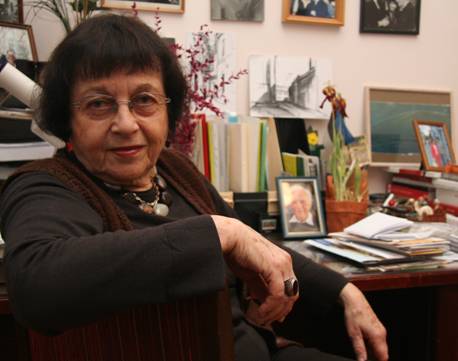
Professor Irena Veisaite
An Interview of Irena Veisaite, by Ellen Cassedy
Irena, you are a Holocaust survivor and have long been involved in Holocaust education initiatives in Lithuania. What do people outside Lithuania need to know about intolerance inside Lithuania today?
Of course there are examples of intolerance in Lithuania. All over the world there is intolerance. But there are also many attempts to promote tolerance in Lithuania. You should not always see only the negative side. We must appreciate positive steps as well.
What about the neo-Nazi march in Vilnius on March 11, independence day, and the swastika flags and anti-Semitic banner that appeared on Hitler’s birthday?
It is upsetting that this happened and that some young people joined that march. But it is also worth noting that both government and society at large reacted in protest against these incidents...
Tue, 3rd May, 2011 - (1) Comment
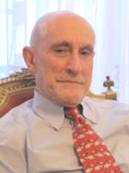
By Yves Plasseraud, Paris
A series of painful and worrying events (Stankeras holocaust denial, Vilnius neo-nazi parade, desacration of the 9th Fort Memorial… the list is sadly long) have recently drawn the attention of Western intellectual and journalists towards what seems to be a substantial increase of antisemitism in Lithuania. The name of Lithuania, associated for centuries (during the period of the Grand Duchy of Lithuania particularly) with the idea of tolerance and social peace, is now more and more being seen as synonym of antisemitism, racism, xenophobia and, another field, homophobia. For many observers, Lithuania is now leading the group of “small” countries where human Rights principles appear forgotten !
There is obviously some exaggeration in this perception, but the recent evolution of Lithuania’s public opinion remains indeed worrying. What happened to this country ? Let’s first try to determine if there are specific causes in the Lithuanian case, and, in the affirmative, what is their nature.
It does not seem to be the experience of World War Two of extensive collaboration with the Nazis and participation to the Holocaust. Countries like Latvia, Moldova or Ukraine share the same terrible memories. It can hardly be the current xenophobia, it is much worse in a country like neighboring Russia. Obliteration of the Holocaust responsibilities seems more obvious in Latvia or in Moldova than in Lithuania. In these conditions, what can be the specificity of the Lithuanian problem?
Mon, 2nd May, 2011 - (3) Comment
QUOTE: Prophet Muhammad (570-632)

Without that I knew about it had my 4-year-old daughter made this drawing,
almost a month after she and I had seen on CNN how the planes crashed
into the twin towers in New York on 11 September 2001.
11 SEPTEMBER 2001: I had just come home to our apartment here in Vilnius after having brought my then 4-year-old daughter home from kindergarten. She was playing on the floor beside me while I sat down to watch the latest world news on CNN. What I saw on the screen in front of me was so unreal that I first could not believe that this was real news.
My first thought was that CNN was showing fragments of a new film or the like.
But it soon dawned on me that what I was seeing was the beginning of an unimaginable attack and a tragedy that would forever change our world's history and development.
11 September 2001 was the day when America was attacked on its own soil. The unthinkable had happened.
Today, 2 May 2011, Osama bin Laden was killed in Pakistan by US special troops.
Mon, 2nd May, 2011 - (2) Comment

Birth of the Prophet Muhammad
(Iranian illustration)
Muhammad was born around the year 570 in the city of Mecca, Arabia. His name means "highly praised." Muhammad's full name was Abu al-Qasim Muhammad Ibn Abd Allah Ibn Abd al-Muttalib Ibn Hashim. He was the last prophet of the religion of Islam…
Mon, 2nd May, 2011 - (1) Comment
CAIRO 4 JUNE 2009: Quoting from the Quran for emphasis, President Barack Obama called for a "new beginning between the United States and Muslims" in his famous Cairo Speech the 4th of June 2009. He said that, together, they could confront violent extremism across the globe and advance the timeless search for peace in the Middle East.
"This cycle of suspicion and discord must end," Obama said in a widely anticipated speech in one of the world's largest Muslim countries, an address designed to reframe relations after the terrorist attacks of Sept. 11, 2001, and the U.S.-led war in Iraq.
The White House said Obama's speech contained no new policy proposals on the Middle East. He said American ties with Israel are unbreakable, yet issued a firm, evenhanded call to the Jewish state and Palestinians alike to live up to their international obligations.
In a gesture to the Islamic world, Obama conceded at the beginning of his remarks that tension "has been fed by colonialism that denied rights and opportunities to many Muslims, and a Cold War in which Muslim-majority countries were often treated as proxies without regard to their own aspirations."
"And I consider it part of my responsibility as president of the United States to fight against negative stereotypes of Islam wherever they appear," said the president, who recalled hearing prayer calls of "azaan" at dawn and dusk while living in Indonesia as a boy.
At the same time, he said the same principle must apply in reverse. "Just as Muslims do not fit a crude stereotype, America is not the crude stereotype of a self-interested empire."
Mon, 25th April, 2011 - (1) Comment
 Lithuania's business people and government officials are yet to learn the necessity of good communications. Without a two way communication there is no possibility for further contacts. One of the most frustrating experiences I had was in e-mail (before that it was in regular "snail mail") communications. I would write and write but receive no reply (with only a few exceptions).
Lithuania's business people and government officials are yet to learn the necessity of good communications. Without a two way communication there is no possibility for further contacts. One of the most frustrating experiences I had was in e-mail (before that it was in regular "snail mail") communications. I would write and write but receive no reply (with only a few exceptions).
When I was working, our management had a rule - "answer all letters received in not more than three days. If there is no answer to be given, then at least acknowledge the receipt".
One of my American colleagues, who was sincerely trying to help Lithuania, said "Sending e-mail to Lithuania is like sending it to the black hole of the universe. Everything goes one way and nothing comes back". No wander he is now disenchanted and helping others.
Vytautas Sliupas, P.E.
www.aukfoundation.org
Burlingame, California
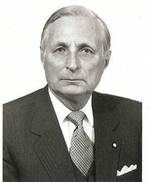 Dear Mr. Myhre,
Dear Mr. Myhre,
I enjoy your positive articles about Lithuania and send them to some 70 friends around the world. The less positive, I keep to myself.
You have lived long enough in Lithuania and must realize that many of the problems of the present day Lithuania are due to their reluctance to learn from the Western countries or accept advice from Lithuanians who lived and studied in the West. The relative success of Lithuania after World War I was largely due to the replacement of Russian educated officials by those who got their degrees in the West. My own father was the first Lithuanian with a degree in forestry from a Western university and introduced major reforms in the forest management, which survived even during the Communist occupation.
Alas, after 20 years of restoration of independence to paraphrase Kipling "The East is East, the West is West and the twain shall never (so far) meet". I spoke to a number of Lithuanians with degrees from top Western universities, who don't want to return to Lithuania - according to them, the "natives" know everything better.
I might add that for me it was easier to obtain an audience with the Pope, than with a Minister for Foreign Affairs of Lithuania.
Yours sincerely,
Ambassador Algirdas Zemaitis
Vilnius – Rome
Mon, 25th April, 2011 - (0) Comment
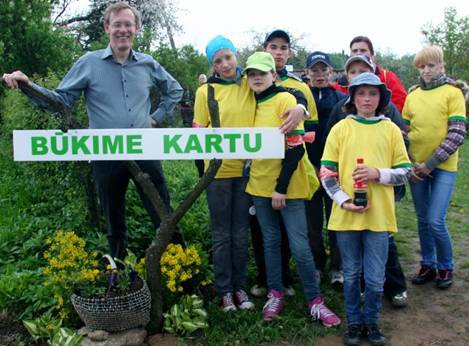
Ambassador Simon Butt (Great Britain) was last year’s patron of the event ‘BŪKIME KARTU’ (‘let’s be together’). The event is organised every May by Vilnius International Club, since 2002, every year bringing more than 100 children from different orphanages and institutions, together with helpers and volunteers from Lithuania’s international community to a farm 26 km north of Vilnius.
The US ambassador hon. Anne E. Derse will preside at the event this year, when an effort will be made to introduce other business and political leaders from other regions of Lithuania so that Bukime Kartu can organically expand throughout all of Lithuania so that many more children can participate in future years. We welcome business leaders, politicians and most of all volunteers to come join us at this year’s event on May 28th at Viva Green Resort. If you would like to know more information about this event, please email us at linas@bangabanga.lt
The European Commission has declared 2011 as the European Year of Volunteering. With that declaration I thought it would be a good idea to review volunteer activities in Lithuania, with special focus on the charitable activities from the foreign community within Vilnius as well as the work of the non-government organization Spiritual Guidance Centre for Youth (“Dvasines Pagalbos Jaunimo Centras” - DPJC).
According to EU statistics, there is a large difference between member states regarding their level of participation for volunteering activities. United Kingdom, Sweden and Austria have volunteering rates that are greater than forty percent of the adult population, whereas in Greece, Lithuania and Italy those number drop considerably to a paltry less than ten percent of the adult population. Why such a big difference? The role of culture probably plays a big role, but political and business leadership or lack thereof also plays an important role.
The Vilnius International Club (VIC) is a membership club that attracts expats from around the world who currently reside in Vilnius has written within its mission statement to engage in charitable activities. The VIC had the idea of organizing a day of activities for orphans that would be organized by VIC and its members which include embassies from around the world. The idea was to bring about 100 orphans to one place, which has been a farm located north of Vilnius for the last 8 years hosted graciously by Zina Ginaitiene and make them feel welcome and cared for through a planned day of organized activities. Thus Bukime Kartu (Let's Be Together) was launched. Every year a different embassy takes the honorary lead role to organize the one day event that must seek out over 100 volunteers to make the day run smoothly.
This year Lt. Col. Stephen Timmons from the US embassy is providing organizational leadership for the event along with chairman Torben Pedersen, as well as a handful of other international volunteers. The US ambassador hon. Anne E. Derse will preside at the event and this year an effort will be made to introduce other business and political leaders from other regions of Lithuania so that Bukime Kartu can organically expand throughout all of Lithuania so that many more children can participate in future years. We welcome business leaders, politicians and most of all volunteers to come join us at this year’s event on May 28th at Viva Green Resort. If you would like to know more information about this event, please email us at linas@bangabanga.lt
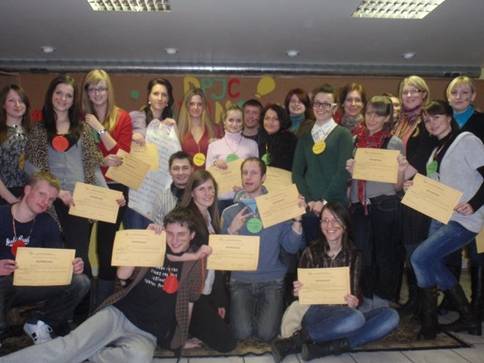
Klaipeda’s Dvasines Pagalbos Jaunimui Centras (Spiritual Guidance Centre for Youth) DPJC was founded in 1994 by visionary Fr. Ed Putrimas who conceived the idea while living in Toronto. He saw the greatest need for a social program in the port city since the other larger cities had already established programs.
The youth crisis line ("Jaunimo Linija") is linked to three cities - Vilnius, Kaunas and Klaipeda, and collectively 93 000 calls and 1 600 letters were answered last year. That equates to over 250 calls and 4 letters each day of the year. On average, one out of every seven callers seeks help because they are suicidal. That's about 36 people per day. To make matters worse, Lithuania has the highest suicide rate in the world (according to WHO from 2008). DPJC realizes this grim statistic and is doing everything within their abilities to help these struggling youths maintain the will to live. Keeping these youths engaged in activities with a feeling of belongingness is one of the main objectives of DPJC.
If you are able to donate old computers, office equipment, sports equipment or toys, DPJC would gratefully accept these items. Also monetary donations could be sent to Darzelio g. 11, Klaipeda LT-93195.
Otherwise we graciously ask working individuals in Lithuania to donate 2% of their taxes to DPJC http://www.dpjc.lt/index.php?page=skirkite-2-dpjc-veiklai, which is a way of helping without opening your wallet,
(https://deklaravimas.vmi.lt/lt/Pradinis_Prisijungimo_puslapis/Prisijungimasperisorinessistemas.aspx)
Please do so quickly because the deadline is May 1st. Please send the editor a confirmation email at editor@VilNews.com and a coupon will be sent to you.
Wed, 20th April, 2011 - (1) Comment
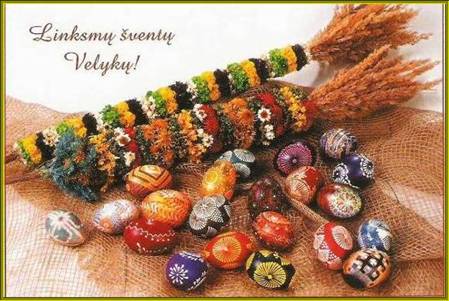
Easter Sunday 1991 represents one of the most magical moments I've ever experienced in my life. The date was the 31st of March, and I wandered through the Old Town of Vilnius together with the one who would later become my wife. A couple of months earlier I stood together with Professor Vytautas Landsbergis in the Lithuanian Parliament building and looked out at the Soviet military forces and the tens of thousands of Lithuanians who flocked there with their bonfires and primitive tools to protect the Parliament. I had seen the coffins of the thirteen brave individuals standing outside the Cathedral in Vilnius, and I had seen how a whole people gathered in grief and despair over the USSR's new assault on this small nation and the innocent civilians who so bravely sacrificed their lives for their home country.

The word for Easter, Velykos, has been borrowed from Byelorussian and means "important day." The word is very accurate because Easter is the year's most solemn feast in Lithuania. Easter is not only the feast of Christ's Resurrection, but also nature's awakening from the winter's sleep.
Wed, 20th April, 2011 - (9) Comment
LIETUVIŲ VELYKINĖS TRADICIJOS

From reading Aage‘s thoughtful words about Lithuanian Easter traditions it tranformed me back in time to when I was a young boy growing up in the Boston area of Massachusetts. Being the son of a Scottish mother and Lithuanian father I had the great fortune of experiencing the wonderfull traditions of not only the Lithuanian people but that of the Highland Scott‘s as well.
Wed, 20th April, 2011 - (0) Comment
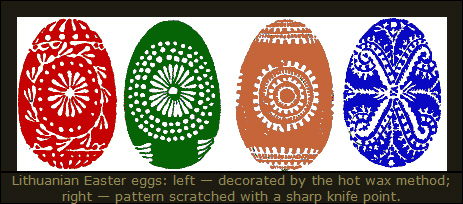
Decoration of Easter eggs - margučiai - is a very ancient custom in Lithuania. At the foot of the Gediminas Hill in Vilnius archaeologists have found eggs made of bone and clay, which shows that this custom was known in Lithuania as early as the 13th Century. Easter eggs are also mentioned by Martynas Mažvydas in his dedication to his book "Hymns of St Ambrosius" (1549). Easter eggs were particularly popular at the turn of the 20th Century. They were decorated both by grown-ups and children, by rich and poor. Some were dyed in a single colour, some were decorated with patterns.
Decorations are produced by painting patterns on warm eggs with the tip of a stick or a pinhead dipped in hot wax. Droplet-shaped strokes are grouped in patterns, twigs of rue, little suns, starlets and snakes. The most frequent pattern is that of a sun, like those on large and small distaffs. Smaller patterns are joined by dots and wavy lines into larger ornaments. Their combinations are so varied that is is impossible to find two identical Easter eggs. Every village has its own best egg-decorators.…
Sun, 17th April, 2011 - (1) Comment
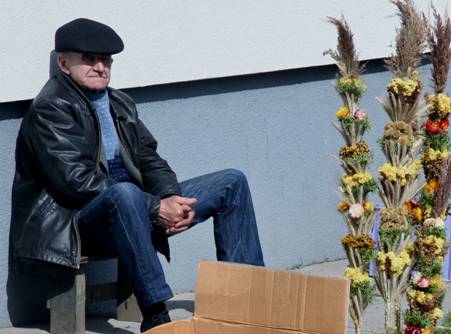
The Christian world celebrates Jesus' noble entry into Jerusalem on the last Sunday before Easter. In Lithuania this day is called Verbų Sekmadienis – Palm Sunday. When Christianity came to Lithuania, plants which sprouted earliest were honoured during spring feasts. Even now, willows, osiers and weeping willows are consecrated on Palm Sunday. Mythological folklore relates that one of the willows, called Blindė, had been a very fertile woman, bearing numerous children. Earth, the most fertile mother was jealous of her. When Blindė walked through a wetfield, her feet sank into the mud. Blindė turned into a willow tree out of great sadness.
The osier, with male spores was regarded as an unusual tree. Folklore tells that the osier grew out of a secretly murdered man. A fife made of osier wood, speaks in a man's voice. Evil spirits avoid it because of its red color.
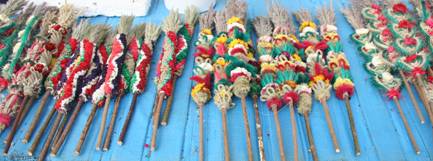
These decorative, dried plant bouquets had no ritual purpose earlier. However now with the addition of juniper and osier branches they have become Palm Sunday tokens. The Vilnius' palm is today produced in fifteen villages in the Vilnius region.
Painters were among the first to show interest in palms. In 1847 K.Ruseckas painted a young girl with a bunch of palms in her hands and in 1913 he presented palms in colorful folk art and trade show posters. The origin of Palms of Vilnius has not been determined. It is thought that they could have been ancient Vilnius trade guilds' processional adornments, manufactured mimicking Jesus' entry into Jerusalem. Vilnius' Palms are created using dried wild plants, forest and garden blossoms and other plant parts. About thirty different plants are used, among them are mosses, berry greens, timothy grass, St. John's worth, tansy, yarrow and many others.
The making of palms begins the day after Shrove Tuesday and continues till Palm Sunday. This is a project that involves the entire family, however most often it is women's work. The most popular palms are roller shaped. Now there are wreath and whip shaped, flat and puffed out.
Tue, 12th April, 2011 - (2) Comment

The deepest foundation on which morality is built is the phenomenon of empathy,
the understanding that what hurts me would feel the same way to you.
Time Magazine, March 2007
Lithuanians are probably among the world’s most contrast-embossed peoples.
On the one hand, this nation brought forth very prominent humanists, thinkers and skilled professionals in many fields; scientists, politicians, businessmen, church leaders and leaders within culture, science and many other areas.
On the other hand, Lithuania is overrepresented among Europe's criminal gangs, and also internally in this country there are many individuals and groups that have given Lithuania an international disgrace spot that will be difficult to wash away, at least in the short term.
I spoke a few days ago with a friend from my home county far up in northern Norway. He told me that five years ago he had become aware of a Lithuanian who had moved to the town where my friend lives. This Lithuanian, my friend told, got a job in a carpentry workshop which had never distinguished themselves with particularly high quality of the products they delivered. But in less than a year all became very different, when the Lithuanian proved to be a very capable carpenter. Not only were the products now supplied of much higher quality and all delivered according to agreed time and price, but also the company itself seemed to undergo a change for the better, all because of a skilled Lithuania that so clearly showed what real quality and work ethics mean for a company.
In the same area in Northern Norway a leading police chief in an interview with a local newspaper asked people to report to the police if they saw cars with Lithuanian number plates, and in another Norwegian district, people have already through several years made it a rule that they alert the police as soon as they see a car with Lithuanian registration plates. Read more…
| Monsignor Kazimieras Vasiliauskas (1922 – 2001) 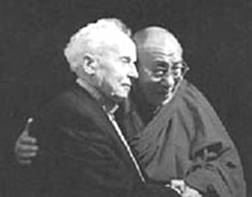 Catholic priest, monsignor. Spent years as a prisoner in Germany and later in Stalin's concentration camps and at the coal mines of Komi, Siberia. The Soviet authorities only permitted him to return to Lithuania in 1969. |
Mafialord Henrikas Daktaras (1957 - ) 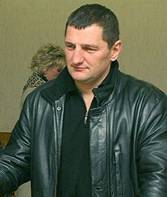 Dr. Henry (alias – Henytė) – one of the most famous criminals of all times in this country. Local media often refer to him as Lithuania’s main criminal authority. |
Mon, 11th April, 2011 - (2) Comment

What happened to Lithuania's identity? This country that for hundreds of years was characterized by tolerance, openness and multiculturalism? This country that 20 years ago arose from decades of Soviet occupation and oppression in a very dignified, admirable way that resonated throughout the world? What happened to the ideals of the Middle Ages, the years between the world wars and the popular movement that triggered the nation’s new declaration of independence in 1990?
Lithuania’s Ministry of Foreign Affairs may have found a way to restore the country’s identity by pioneering a new type of symbol to convey the character of this nation in a ‘fragrant way’ – with a bottle of perfume. The ministry has already sent bottles of the new fragrance to Lithuania’s embassies around the globe. The project with olfactory appeal is "a good example of how to communicate Lithuania to the public in an innovative way", according to a foreign ministry statement. "We wanted to create something special, representing Lithuania and the Lithuanian character," Mindaugas Stongvilas, an expert in emotional communication behind the project told the newspaper Vilniaus diena earlier this year.
In Scandinavia and the British Isles, it is probably the word crime, which will be first mentioned if one is asked to say something about Lithuania’s identity of today, though most people know very little about Lithuania whatsoever.
The few times Lithuania is 'honoured' with headlines in Western media, it involves, unfortunately, all too often stories about crime or about the nation's homophobia and the neo-Nazis’ parades and newfound popularity in a country that above all others should have learned from the sad and serious mistakes to its own Jewish population during the years of Holocaust.
Identity is much more than new slogans, logos, or perfume-stunts – although they also are of important elements in creating a new country profile.
My suggestion is that this nation looks back to the times when tolerance, dignity and widely recognized respect for other nations, religions and cultures was this country's hallmark and identity.
Because that’s what this fine country deserves...
Sat, 9th April, 2011 - (2) Comment
Russia’s nuclear projects:
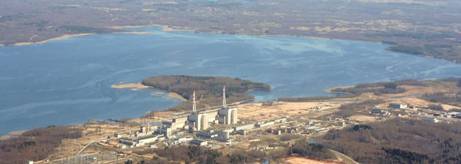
Ignalina Nuclear Power Plant on the shore of Druksiu lake
Russia can turn the lights out on Lithuania and the other two Baltic states any time it pleases. And they can't turn them back on without Russia’s permission. Not only does this small, central European nation, as well as its neighbors Latvia and Estonia, not have access to the Russian owned-switch, but, to a large extent, it also depends on energy supplies from Russia to power its electricity generating plants; power that is needed for energy and economic independence. Lithuania as well as the other Baltic countries, being poor in energy resources, are facing a tough future and are seeking solutions. What would you do?
VilNews e-magazine is published in Vilnius, Lithuania. Editor-in-Chief: Mr. Aage Myhre. Inquires to the editors: editor@VilNews.com.
Code of Ethics: See Section 2 – about VilNews. VilNews is not responsible for content on external links/web pages.
HOW TO ADVERTISE IN VILNEWS.
All content is copyrighted © 2011. UAB ‘VilNews’.